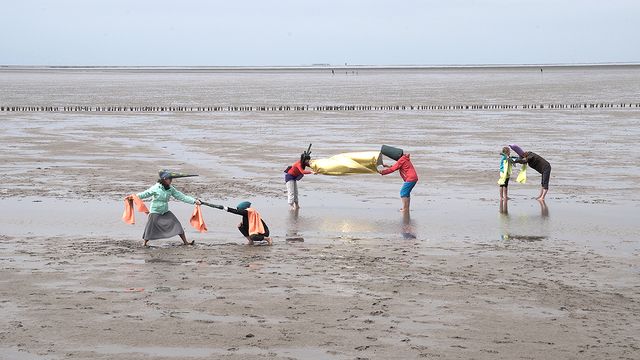Online program
#Caring: Workshops & Film

To care is to recognize all bonds, between both humans and non-humans; between humans and their systems, their infrastructures and institutions, and to attend to their fragility. Ethics of care challenge us to construct social relations and systems based on situational and contextual morality, beyond abstract or universal notions of justice, to allow us to turn to processes of care, re-pair, maintenance and healing. More information...
Saturday, Jun 13
Workshops and films open up conversations around the terminologies, potentials and tensions embedded in the field of care – from the rural-urban conundrum to queer-feminist, Black feminist and postcolonial propositions.
10am–12 noon online, with registration
Workshop #1: Ill Will and the Biopolitics of Care
With Edna Bonhomme
When does a person consider themselves sick and how do (post)colonial and (post)migration residues shape the way people archive, narrate and navigate care? The racialization of epidemics continues to result in very disparate outcomes, leaving some to fall ill and others not. This workshop will consider how bioprivilege operates and how it functions in opposition to the politics of care. In an attempt to overcome reductive and universal claims about care, the workshop troubles ill will and care through the novel coronavirus and other epidemics and tries to see how the most marginalized in Europe encounter ailments. Care is at the core of queer and feminist traditions; it is ubiquitous and cultivated in how people move through the world and determines whether they survive or thrive. This workshop explores how the intimate relationship between toxicity, health and care can help to enliven how people heal.
1–3pm online or at HKW, with registration
Workshop #2: Agro-Centric Thinking: A Pathway to a Collective Biographical Imagination?
With Andreas Doepke, hn. lyonga
In English, German translation is possible
In this dialog-centric workshop, participants will explore how agriculture is related to caring. Can agriculture maintain its presence across personal biographies, even after its practices have been abandoned during one’s own life or in previous generations? The participants will discuss how the ”fixity” of land as an infrastructure leaves tangible and intangible traces within us. How could these vestiges be activated as a resource that reinvigorates the ties between the rural and the urban? In a “round table” conversation, potentials of this knowledge of caring for self, a rural community, for land, plants, and animals will be scrutinized. Whether in the form of nostalgia or the cardinal principle of providing shelter, food, access to education and a strong sense of accountability, the inheritance of caring for land translates to many other contexts and may help to enhance a collective future. For this workshop, in addition to online participation, it is planned to enable participation on-site at HKW. This decision is based on current guidelines on how to deal with the coronavirus SARS-CoV-2 and will be communicated to registered participants by email.
4–7pm online, with registration
Workshop #3: Future(s) Otherwise: Dreaming with Oracle Practices
With Loren Britton, Romi Morrison, Helen Pritchard, Eric Snodgrass
In English, German translation is possible
The workshop engages methods from Black Feminist Poet(h)ics, and asks questions about our computational environments. Through a guided process of welcoming, writing, choosing, reading and intuiting, the participants will pose questions to an oracle that allow for thinking the world otherwise. The oracle is a source to work with, not to extract from. In the workshop the oracle will be the text: M Archive: After the End of the World, the 2018 book of poetry from Alexis Pauline Gumbs. Rethinking what ethics for computational practices are, the workshop conveners propose oracle(s) as a critical-technical practice for opening up possibilities and imaginations for accountability that arise within automation and digitalisation. Oracle(s) demands that we think the world differently and practices what it might mean for all of us to be free.
8–9pm Live stream on hkw.de
Public program: The Book of S of I. Chapter One: Creatures born from Hopelessness
Online film screening by Malu Blume, followed by an artist talk, moderated by Sascia Bailer
Another world, post-apocalypse. In their video work Malu Blume takes the viewer back to the future: The first part of their trilogy appears like a feverish nightmare turning into utopian dreams. Bodies aligned in pleasure, summoning the ghosts of the past and the future. The Book of S of I is a queer feminist sci-fi saga about the desire to belong, about the power of mutual care, bodily pleasures and the yearning for tenderness. The video was realized in collaboration with İpek Hamzaoğlu and Laura Nitsch from HEKATE – Film & Video Collective, Marwa Abou Hatab, Roya Asaadian, Magdalena Fischer, Camila Rhodi, Sofi Utikal and Rosa Wiesauer. It was specifically developed for Fantastic Futures, the Advancement Award Exhibition at M.1 of the Arthur Boskamp-Stiftung.